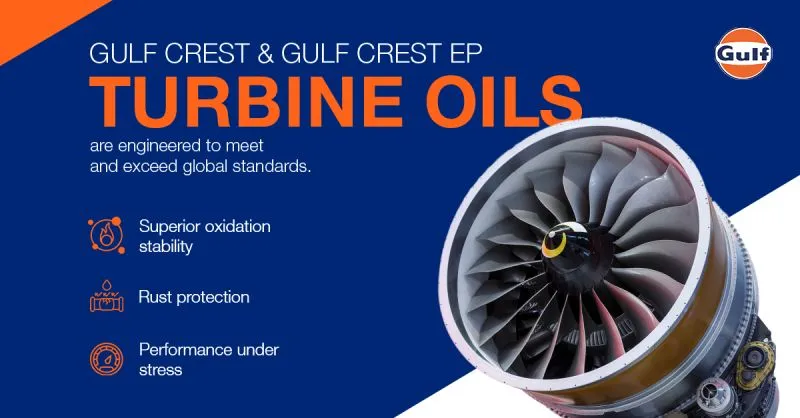Everything You Need to Know About Turbine Oils in Power Generation
25 Jan 2026

Modern power generators must deliver reliability and efficiency at all times, despite the extreme conditions under which they operate. The role of turbine oils in power generation is absolutely integral to achieving this, whether in steam, gas, or combined-cycle power plants. Even minor lubrication issues can result in costly downtime and unplanned outages, while advanced turbine oils ensure smooth operation, reduce wear, and safeguard against system failures.
Here is everything you need to know about turbine oils in power generation: their roles, benefits, and how advanced formulations support long-term operational reliability.
What Is Turbine Oil?
Turbine oil is a specialist industrial oil designed to meet the specific demands of steam and gas turbines. Turbine oil is used in power plants and other heavy industrial applications, where machinery experiences extreme loads and operating conditions. Unlike conventional lubricants, turbine oils are engineered to withstand high temperatures, resist oxidation, and maintain stability over long service intervals.
In essence, turbine oil is a mineral-based or synthetic base oil enhanced with carefully selected additives. These additives improve oxidation stability, resist rust and corrosion, minimise foaming and varnish generation, and maintain consistent viscosity under stress. These attributes are all crucial for uninterrupted turbine operation and efficiency- as such, the role of turbine oils in power generation cannot be underestimated.

What Is Turbine Oil Used for in Power Generation?
Turbine oils in power plants serve a breadth of purposes far beyond basic lubrication. They are integral to multiple processes, including:
- Lubricating bearings and gears, thus minimising friction and wear.
- Cooling system components by dissipating excess internal heat, protecting critical parts from damage.
- Transmitting hydraulic power in turbine control systems.
- Preventing rust, corrosion, and the build-up of varnish and carbon deposits that compromise efficiency and accelerate component wear.
Without high-quality advanced turbine oils, turbines face premature wear, reduced operational efficiency, and a significantly higher risk of unplanned outages.
The Key Functions of Turbine Oils
The role of turbine oils in power plants is to maintain the health and reliability of the machinery; their key functions include:
- Reduction of Friction: Ensuring smooth contact between moving parts.
- Removal of Heat: Transferring heat away from critical surfaces and safely dissipating it.
- Oxidation Resistance: Preventing oil degradation under high temperatures and loads.
- Contamination Control: Minimising the corrosive impact of particles and water, and inhibiting the formation of carbon deposits, varnish, and sludge.
- Hydraulic Performance: Supporting precision of control within turbine governing systems.
Together, these functions clearly demonstrate how critical turbine oils are for the power generation industry.
How Does Turbine Oil Improve Reliability in Power Plants?
Increased power plant reliability translates directly to higher profitability and better energy security. High-performance turbine oils contribute to improved reliability in several ways:
- Extended Service Life: Advanced formulations resist oxidation, oil breakdown, and sludge formation, reducing the need for frequent oil changes.
- Reduced Downtime and Unplanned Outages: Stable oils minimise varnish and deposit buildup, preventing sticking valves or bearing failures.
- Improved Efficiency: Cleaner operation reduces internal friction, minimising energy losses through drag and heat and optimising overall turbine output.
- Enhanced Protection: Additives shield components from corrosion and wear, even under fluctuating loads and harsh environments.
By improving reliability, turbine oils reduce operating costs, unplanned outages, and scheduled downtime while ensuring power plants can maintain optimal function and consistently meet energy demands.
Is There a Difference Between Traditional and Advanced Turbine Oils?
Yes, there is a marked difference between the two. Traditional turbine oils are usually based on mineral oils with limited additives. They provide adequate lubrication but have limited oxidation resistance, leading to more rapid oil breakdown and carbon deposit formation over time.
Advanced turbine oils are made using specifically designed modern base oils and high-performance additives. These enhanced formulations offer:
- Superior oxidation resistance.
- Better control of sludge and varnish.
- Longer oil life, reducing maintenance frequency.
- Improved thermal stability for high-output turbines.
As industrial technology advances, the demand for high-performance oils is ever-increasing. Nowadays, advanced formulations are the preferred choice of turbine oil for all modern power plants.
What Is the Difference Between Turbine Oil and Hydraulic Oil?
Although turbine oils and hydraulic oils may appear similar, they are designed for different functions and perform quite distinct roles:
- Turbine Oils: These are designed to cope with the extreme operating conditions of turbines and compressors, and so are optimised for high-temperature stability, oxidation resistance, and long-term lubrication. In some turbine systems, they also double as a hydraulic medium, assisting in power transmission and control.
- Hydraulic Oils: These are specifically engineered for power transmission in hydraulic systems. As such, anti-wear protection, foaming resistance, and consistent flow under pressure are prioritised, while thermal stability and oxidation resistance are less of a focus.
In essence, turbine oils offer broader protection and durability under extreme load, while hydraulic oils are formulated to maximise the performance of hydraulic circuits.
Why the Right Turbine Oil Matters
Within the energy sector, the pressure to deliver more power at lower operating costs, while reducing emissions, is ever-increasing. Turbines are pushed to operate at higher loads for longer intervals without downtime, and as a result, the role of turbine oils in power generation is becoming increasingly pivotal. By opting for advanced turbine oils such as Gulf Crest EP, operators can achieve higher efficiency, reduce operational interruptions, and extend equipment life, all while supporting the transition to cleaner energy.
Turbine oils in power generation are far more than simple lubricants- reliability, efficiency, and safety of operations hinge upon their role. Reducing friction and heat, preventing oxidation and deposits- turbine oils ensure turbines can meet the growing demand for energy without disruption. As the industry shifts its focus to higher performance and longer service intervals, advanced turbine oil formulations are now essential.
Gulf Oil have decades of experience in industrial oils, providing proven solutions tailored to the evolving demands of the power generation industry. To source high-quality industrial oils and invest in the future of your heavy machinery, contact Gulf Oil today, and one of our advisors will be happy to help.

